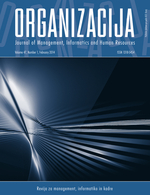Evaluation Model for Managing Global ERP Project Complexity
Abstract
The implementation of complex ERP systems in global business environments requires a sound methodological approach. Companies have been experiencing many project failures in the past, since the projects by far exceeded their time and budget frameworks and/or did not render the expected results. In the article is presented a study of critical success factors (CSFs) which the companies should take into account in every ERP project. Presented are case studies of five anonymous companies belonging to the international corporation. The focus is on the definition of the global efficiency factors or GEFs which allow us to design a global concept of the whole ERP system and are more broadly defined than CSFs. Thus are ensured efficient and productive roll-out implementations in all subsequent companies of the group. Developed was a multi-attribute evaluation model based on these factors which focuses primarily on the content of the system and not that much on the project management CSFs. GEFs namely allow us to efficiently manage the complexity of the ERP implementation projects while the multi-attribute evaluation model makes it possible to evaluate the project in its different project stages, thereby measuring whether the project is on track in terms of its global content design. The results of the evaluation were also analyzed by positioning the five case study projects on the maturity curve for both being implemented with or without the use of GEFs.
Refbacks
- There are currently no refbacks.

